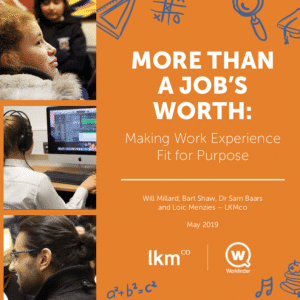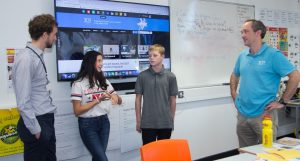Effective work experience: Let’s talk about WEX
My time on work experience was thoroughly enjoyable. A school mate and I spent a week working half days in a nursery school. At the end of the week I was told that while it had been “fun” having me around, if they had to pick between us, they’d pick my friend because “he doesn’t get the children so over-excited.” That was about the extent of the feedback I received while on my work experience placement, and I can’t say I really gave it any more thought once the placement finished.
My own experience provides one, small snapshot of how work experience is a wasted opportunity for many people. Indeed, many people don’t participate in any form of work experience at all.
Our new report, ‘More Than A Job’s Worth: Making Work Experience Fit For Purpose’, is published today and looks at how work experience (or ‘WEX’ as it’s sometimes referred to) could be made more effective for young people, schools and employers.
Commissioned by Founders4Schools and Workfinder, the report is the second in our ‘More Than A Job’s Worth’ series on careers education, and builds on the findings of Making Careers Education Age-Appropriate, published last month.
The young people who should be accessing work experience are less likely to
Work experience is often arranged through family networks and this disadvantages those without connections in certain sectors. Our research therefore revealed important inequalities relating to parental income and poverty, gender, minority ethnic status, special educational needs and disabilities.
Work experience is often left for pupils to organise on their own, disadvantaging those without networks and contacts in areas they want to explore, finds @LKMcoHQ's new report on #workexperience Click To TweetWe therefore call on schools and employers to work together to ensure that pupils are not left solely responsible for finding work experience themselves. Instead they should be supported to identify and secure placements linked to jobs or sectors they are interested in. This support can come from school, or via brokerage platforms that link young people directly with employers (such as Workfinder).
We also argue that schools and employers should prepare young people for their placements and that once placements are over there should also be time for reflection.
Work experience should target older pupils, who stand to gain more from it
Like many, my nursery school placement took place in the summer whilst I was at secondary school, but actually, our research shows that it is older pupils who stand to benefit more. We are therefore calling on schools and colleges to delay work experience until the post 16 phase.
We also show how re-structuring work experience can make it more impactful by supporting repeated encounters with employers and spreading placements out throughout a term or year (as opposed to ‘clumping’ a week-long placement at the end of the school year, after exams). This can increase the placements’ impact and open up opportunities, because employers are not expected to host a young person for one, longer period.
The report highlights examples of innovative practice already underway in settings across the UK, including:
- XP School in Doncaster, which allows pupils to work on extended projects involving employers and which focuses on solving problems in their local community.
- School 21 in Newham, which spreads pupils’ placements out so that pupils build longer-term relationships with local employers while working on meaningful projects that help them apply and develop knowledge and skills – while also benefitting the employer.
- Stirling High School and Stirling Council, which has been using a brokerage platform to link pupils with employers and ensure placements meet pupils’ needs.


